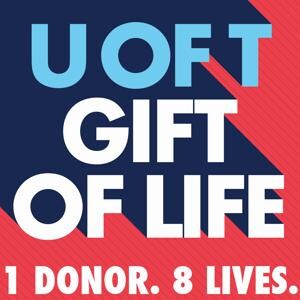Mobile Menu
- Education
- Research
-
Students
- High School Outreach
- Undergraduate & Beyond: Community of Support
- Current Students
- Faculty & Staff
- Alumni
- News & Events
- Giving
- About

The University of Toronto will launch a campaign with the Trillium Gift of Life Network on January 13, 2014, to encourage faculty, staff and students to register as organ donors. Every three days in Ontario, a patient dies waiting for an organ transplant, and the Greater Toronto Area has one of the lowest donor registration rates in Canada.
One organ donor can save up to eight lives. Most Ontarians say that giving consent for organ donation is important, but in the GTA only about 15 per cent are registered. Many people mistakenly believe they are registered because they have signed a paper donor card, but the cards are often not available at the time of need, and the province does not record the information on them.
“For those in the U of T community who want to be donors, this campaign is a great opportunity to ensure they are registered,” said Professor Jill Matus, Vice-Provost Students & First-Entry Divisions at U of T. “We know the University can take a leadership role for the GTA in organ and tissue donation, and really make a difference for those who so desperately need a transplant.”
Potential donors often have concerns that prevent them from registering. These include the belief that their organs are too old or unhealthy, and that they won’t be able to have a funeral with an open casket. But age and health typically aren’t barriers to registration, and most procedures have no impact on funeral arrangements.
Another common misconception is that transplants often don’t work. Transplants save and enhance lives, and include a growing range of organs and tissue: heart, liver, kidneys, pancreas, lungs, small bowel, stomach, corneas, heart valves, bone and skin.
“Transplant medicine has come a long way in a very short time,” said Professor Catharine Whiteside, Dean of the Faculty of Medicine at U of T. “Despite the complexity of the procedures, the biggest challenge we face today is not only how to preserve the function of transplanted organs by controlling a patient’s immune response — equally important is recognizing the shortage of organs for transplantation.”
The University of Toronto has played a central role in the progress of transplant medicine. The University and its affiliated hospitals were home to the first and largest organ transplant program in Canada. Surgeons at the Toronto General Hospital performed the world’s first single and double lung transplants, and today the University Health Network’s Multi-Organ Transplant Program provides surgery to 400 patients and follow-up care for 5,000 patients every year.
The University’s organ and tissue donor registration campaign will run from January 13 to 24, 2014, but members of the U of T community can register any time at https://beadonor.ca/uoft.
It only takes two minutes to register.